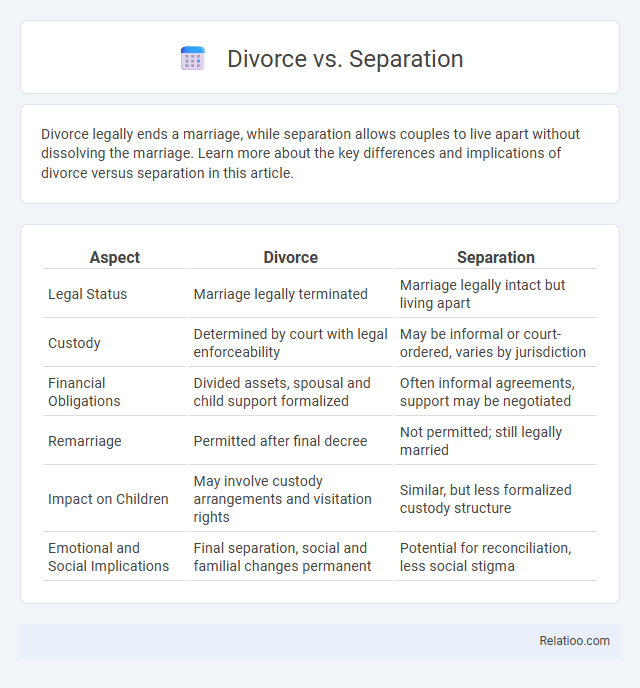Divorce legally ends a marriage, while separation allows couples to live apart without dissolving the marriage. Learn more about the key differences and implications of divorce versus separation in this article.
Table of Comparison
| Aspect | Divorce | Separation |
|---|---|---|
| Legal Status | Marriage legally terminated | Marriage legally intact but living apart |
| Custody | Determined by court with legal enforceability | May be informal or court-ordered, varies by jurisdiction |
| Financial Obligations | Divided assets, spousal and child support formalized | Often informal agreements, support may be negotiated |
| Remarriage | Permitted after final decree | Not permitted; still legally married |
| Impact on Children | May involve custody arrangements and visitation rights | Similar, but less formalized custody structure |
| Emotional and Social Implications | Final separation, social and familial changes permanent | Potential for reconciliation, less social stigma |
Understanding Divorce and Separation
Divorce legally terminates a marriage, granting individuals the right to remarry and resolving issues like asset division and child custody through the court system. Separation involves spouses living apart without ending the marriage, often used as a trial period or for personal, financial, or legal reasons while remaining legally married. Understanding the distinctions between divorce and separation is crucial for navigating legal responsibilities, financial arrangements, and emotional impacts during relationship transitions.
Key Differences Between Divorce and Separation
Divorce legally ends a marriage, dissolving the marital bond and allowing both parties to remarry, while separation means living apart without legally ending the marriage, leaving certain rights and responsibilities intact. Separation can be temporary or permanent but does not alter marital status, whereas divorce involves court proceedings to resolve issues like property division, child custody, and spousal support. Understanding these distinctions helps you make informed decisions about your relationship's future and legal obligations.
Legal Implications of Divorce vs Separation
Divorce legally terminates a marriage, granting individuals the right to remarry and necessitating court orders for asset division, child custody, and support arrangements. Separation, often formalized through a legal separation agreement, allows couples to live apart without dissolving the marriage, preserving certain marital rights and obligations. Disruption, a less commonly used term, typically refers to the breakdown of a relationship without formal legal recognition or processes, lacking the enforceable legal consequences inherent in divorce or separation.
Financial Impact: Divorce Compared to Separation
Divorce typically results in a more permanent financial settlement, including division of assets, spousal support, and potential changes to tax status, whereas separation often involves temporary arrangements that may not legally finalize financial responsibilities. Your financial obligations during separation might remain intertwined, meaning debts and assets could still be shared, unlike in divorce where a court typically enforces a clear division. Disruption, less commonly defined legally, can cause unpredictable financial consequences due to the sudden change without formal agreement or legal framework.
Emotional and Psychological Effects
Divorce, separation, and disruption each carry distinct emotional and psychological effects that can impact your mental health profoundly. Divorce often involves a legal finality that may trigger grief, anxiety, and a sense of loss, while separation can create prolonged uncertainty and stress due to its ambiguous status. Disruption, typically sudden and unplanned, can result in intense emotional turmoil, including shock and confusion, affecting coping mechanisms and overall well-being.
Child Custody and Parenting Considerations
Divorce finalizes the legal dissolution of marriage, impacting child custody arrangements by requiring court-approved parenting plans that define custody, visitation, and support. Separation allows couples to live apart while remaining legally married, often involving temporary custody agreements that prioritize the child's stability and well-being during the transitional period. Disruption refers to the sudden termination of the parental relationship, which may necessitate emergency custody decisions to protect the child's safety and maintain consistent caregiving, ensuring Your child's best interests remain central throughout these processes.
Effects on Property and Asset Division
Divorce legally terminates a marriage, triggering a formal division of property and assets based on state laws, often resulting in equitable or community property distribution. Separation, especially legal separation, involves living apart without dissolving the marriage, allowing couples to negotiate temporary or permanent arrangements for asset management without transferring ownership. Disruption, a less common legal term, typically refers to the breakdown of a relationship without formal legal proceedings, often leaving property division unresolved and subject to individual claims or later litigation.
Religious and Cultural Perspectives
Divorce, separation, and disruption are viewed differently across religious and cultural contexts, shaping individuals' responses and social consequences. In many religious traditions like Islam, Christianity, and Hinduism, divorce may be discouraged or regulated, emphasizing reconciliation or spiritual purity, while separation often serves as a socially acceptable intermediary phase. Disruption, though less formally recognized, can refer to informal or unacknowledged breaks in relationships, reflecting cultural norms about family unity and communal reputation.
Pros and Cons of Divorce and Separation
Divorce legally ends a marriage, providing clear financial and legal resolution but often involves lengthy, costly court processes and emotional stress. Separation allows couples to live apart while remaining legally married, offering time to evaluate the relationship's future without the finality of divorce, yet it may create uncertainty in financial and parental responsibilities. Both options require careful consideration of individual circumstances, including emotional well-being, financial stability, and long-term goals for family dynamics.
Choosing the Right Path: Factors to Consider
Choosing the right path between divorce, separation, or disruption depends on factors such as legal implications, financial consequences, and emotional readiness. Divorce legally ends a marriage with full dissolution of marital ties, while separation allows couples to live apart without terminating the marriage formally. Disruption applies to annulment or cancellations based on specific grounds, often requiring proof of invalidity within a certain period.

Infographic: Divorce vs Separation
 relatioo.com
relatioo.com